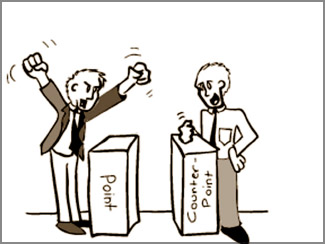 Know-it-all
situation Know-it-all
situation
"You will never get into trouble by
admitting you may be wrong. That will stop the argument and inspire your
opponent to be just as fair and open and broad-minded as you are" -
Dale Carnegie.
Do
you like when others say that you don't know anything? Probably not.
Because you inherit that quality of " feeling perfect" as a human being.
Naturally we like to show off that we know everything, though we really
are not. It's quite impossible for a person to be jack of all trades.
And most often we exhibit the quality of 'master of none'.
Some people, you might have met in life, are never ready to accept
what others say, if they can't agree with what the other person says or
rather they oppose it. They go on arguing and refuting other person's
point of view. It turns out to be a cumbersome situation when you have
to face it. Because that person is very adamant in his views and eager
to prove that only he is correct and the other party is wrong.
This is okay and helpful, at times when different ideas are put
forward. When I was in Grade 11, there was an argument between two
bright students. They both wanted to emphasise that they were correct
and didn't seem want to be second to either of them. The argument was
about what the world's longest river is.
Sheron said it is Amazon of South America, and Winnie said it is
Mississippi. Then Sheron turned around and yelled at Winnie " What did
you say? Don't be silly, how come the world's longest river could be
Nile.
Haven't you learnt it correctly in the primary class". Sheron seemed
to be very confident of what she knew and wanted to show others that she
knew everything. But Winnie never wanted to admit that she was correct.
She remained silent while Sheron was disproving what Winnie said.
 It
ultimately became a headache to the entire class when Sheron kept on
telling that little knowledge is dangerous and Sheron has to study hard
in order to pass the exam and so on. It
ultimately became a headache to the entire class when Sheron kept on
telling that little knowledge is dangerous and Sheron has to study hard
in order to pass the exam and so on.
The monitor got up from her seat and fetched our history teacher and
threw the questions at her. ' World's longest river is Nile of Africa,
and the second longest is Amazon of South America". After the history
teacher left the class, everyone could see that Sheron's face became
flushed with embarrassment. She appeared to look like a fool in front of
the whole class.
So what if you do face such a situation? How are you going to
emphasise to the other party of your opinion or idea , when you're too
sure that you're correct? You may not have to be embarrassed if your
answer is not correct.
You just have to show off your smartness without bruising others ego.
You can suggest that your answer may be wrong without looking like a
heartless know-it-all. It is always advisable to say " You know, you're
probably right, but I always thought that Nile is the world's longest
river. Shall we ask our history teacher or shall we Google it?
By doing so, you can always avoid engaging in heated arguments and
you rarely have to be the bearer of false facts. Plus, it is far more
convincing about seeing a fact on a reliable source.
'So, be a good sport and look up, even if you're too sure about
yourself, it feels like a waste of time. Who knows? You might find out
you weren't as correct as you thought you were'.
When there seems to be an argument, if you decide to speak up, it is
wise to start by admitting you may be wrong. When you avoid slamming
someone for his or her ignorance and start by saying something like this
" You may be right" then you can gain more benefit out of your talk.
Other person might think that you do respect his intelligence. When
you admit that you can be wrong you pave the path for other person to do
the same. You will protect yourself from potential humiliation. Don't
you think that you will have to feel kind of lame if you find out you're
wrong when you start by asserting that you're totally and unquestionably
right?
It is true a few of us are right as often as we think. As Dale
Carnegie said "You'll never get into trouble by admitting you may be
wrong". |
